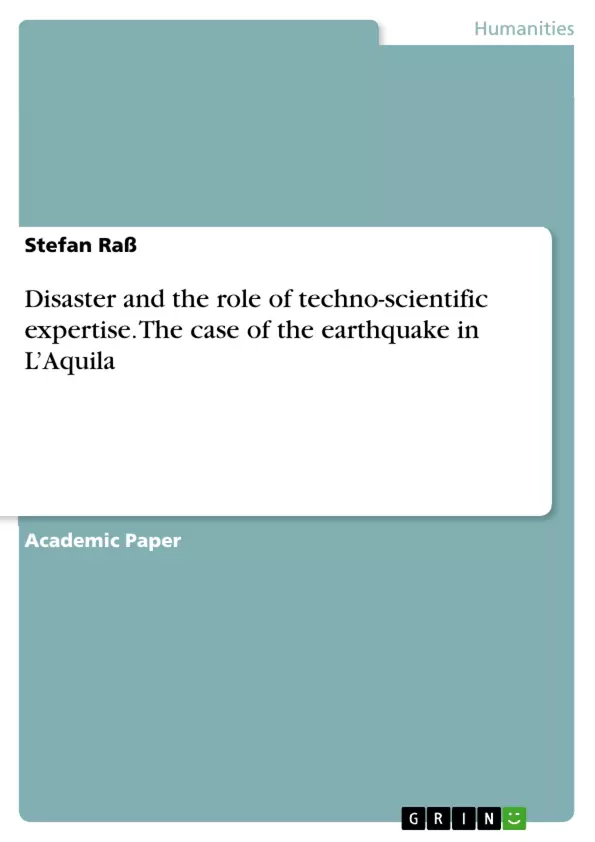The outline of the events surrounding the earthquake show, that at the heart of the L’Aquila case lies the notion of expertise. This paper will first formulate a research question that seeks to understand the conceptualizations of normative and non-normative approaches to expertise. Subsequently both lines of thought will be discussed in detail. The following chapter will then reflect on what both approaches will allow us to see in the case of the L'Aquila earthquake. Finally, the last chapter will summarize the findings, providing further context and contrast to both lines of thought.
Inhaltsverzeichnis (Table of Contents)
- Introduction
- Research Question
- Basic Assumption of Expertise in Key STS Literature
- Misunderstood Misunderstanding
- The Study of Expertise and Experience
- Expertise and the L'Aquila Case
- Conflict of Social Identity and the Importance of Historical Context
- Contributing and Interacting During Techno-Scientific Uncertainty
- Normative and Non-Normative Conceptualizations of Expertise
- Literature
Zielsetzung und Themenschwerpunkte (Objectives and Key Themes)
This paper aims to understand how normative and non-normative approaches to expertise conceptualize the controversy surrounding the L'Aquila earthquake. It examines the dynamics of expertise and how certified experts and lay-scientists interact in a crisis situation.
- The role of expertise in disaster situations
- The conflict between certified experts and lay-scientists
- The impact of historical context and social identity on trust in expertise
- The limitations of traditional normative conceptions of expertise
- The potential of non-normative frameworks for understanding expertise
Zusammenfassung der Kapitel (Chapter Summaries)
- Introduction: This chapter sets the stage for the paper by outlining the events surrounding the 2009 L'Aquila earthquake and the controversy that followed. It introduces the concept of expertise and its importance in this case.
- Research Question: This chapter presents the overarching research question of the paper, which explores how normative and non-normative approaches to expertise conceptualize the L'Aquila controversy.
- Basic Assumption of Expertise in Key STS Literature: This chapter examines two key STS approaches to expertise: Wynne's Misunderstood Misunderstanding and Collins and Evans' notion of expertise and experience. It analyzes their core assumptions and concepts as a foundation for further analysis.
- Expertise and the L'Aquila Case: This chapter applies the theoretical frameworks discussed in the previous chapter to the L'Aquila case, analyzing the conflict between social identities and the role of expertise in managing scientific uncertainty during the earthquake crisis.
Schlüsselwörter (Keywords)
The paper focuses on the following keywords: expertise, science-technology relations, disaster, L'Aquila earthquake, social identity, lay-expertise, certified expertise, normative and non-normative approaches, STS, risk perception, trust.
Frequently Asked Questions
What is the central theme of the L’Aquila earthquake case study?
The paper examines the role of techno-scientific expertise during the 2009 L'Aquila earthquake and how different conceptualizations of expertise influenced the controversy that followed.
What is the difference between normative and non-normative expertise?
Normative approaches focus on established standards and certified experts, while non-normative frameworks analyze how expertise is socially constructed and how lay-scientists interact with professionals.
Which STS scholars are mentioned in the paper?
The paper discusses Brian Wynne’s concept of "Misunderstood Misunderstanding" and Collins and Evans' study on expertise and experience.
How did social identity affect the L'Aquila case?
The research highlights the conflict of social identity and historical context, which played a crucial role in how the public trusted or challenged scientific expertise during the crisis.
What are the limitations of traditional expertise in disaster situations?
Traditional normative conceptions often struggle with techno-scientific uncertainty and the integration of local or lay-knowledge, which can lead to social friction during disasters.
- Citation du texte
- B.A. Stefan Raß (Auteur), 2017, Disaster and the role of techno-scientific expertise. The case of the earthquake in L’Aquila, Munich, GRIN Verlag, https://www.grin.com/document/1001844



